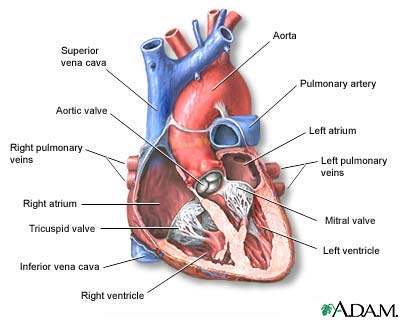Treatment
The treatment depends on the location of the aneurysm.
For patients with aneurysms of the ascending aorta or aortic arch, surgery to replace the aorta is recommended if the aneurysm is larger than 5 – 6 centimeters. The aorta is replaced with a fabric substitute.
This is major surgery that requires a heart-lung machine. If the aortic arch is involved, a specialized technique called “circulatory arrest” may be necessary. This involves a period without blood circulation while the patient is on life support.
There are two options for patients with aneurysms of the descending thoracic aorta. If the aneurysm is larger than 6 centimeters, major surgery is done to replace the aorta with a fabric substitute.
Endovascular stenting is a less invasive option. A stent is a tiny metal or plastic tube that is used to hold an artery open. Stents can be placed into the body without cutting the chest.
Instead, tiny, hollow tubes called catheters are inserted into the groin area. The stent is passed through the catheter and into the area of the aneurysm. Not all patients with descending thoracic aneurysms are candidates for stenting, however.
Prognosis (Expectations)
The long-term prognosis for patients with thoracic aortic aneurysm is determined by other medical problems such as heart disease and diabetes, which may have caused or contributed to the condition.
Complications
Serious complications after aortic surgery can include:
- Bleeding
- Graft infection
- Heart attack
- Irregular heartbeat
- Kidney damage
- Paralysis
- Stroke
Death soon after the operation occurs in 5 – 10% of patients.
Complications after aneurysm stenting include damage to the leg, which may require another operation.
Calling Your Health Care Provider
Tell your doctor if you have:
- A family history of connective tissue disorders
- Chest or back discomfort
Pictures & Images
-
Thoracic aortic aneurysm: Overview, Causes
-
Thoracic aortic aneurysm: Symptoms & Signs, Diagnosis & Tests
-
Thoracic aortic aneurysm: Treatment
Review Date : 5/6/2009
Reviewed By : Robert A. Cowles, MD, Assistant Professor of Surgery, Columbia University College of Physicians and Surgeons, New York, NY. Review provided by VeriMed Healthcare Network. Also reviewed by David Zieve, MD, MHA, Medical Director, A.D.A.M., Inc.

